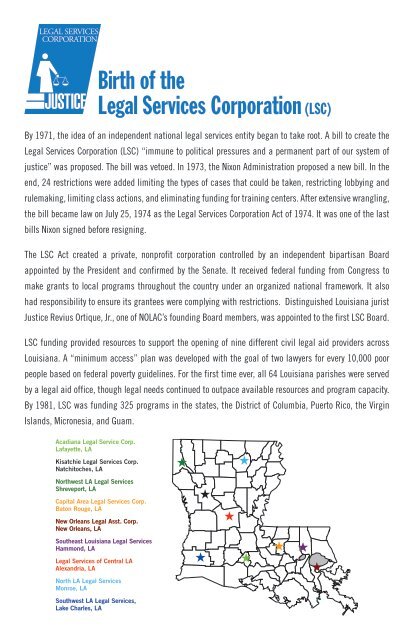SLLS 50th Anniversary Justice is Golden Exhibit Program Book
The Justice is Golden exhibit at the Louisiana Supreme Court Museum commemorates the 50th anniversary of Southeast Louisiana Legal Services. The exhibit looks back at the past 50 years of the organization's work to fight for fairness for low-income people in Southeast Louisiana and looks forward to the future of our continuing work to increase access to justice for everyone.
The Justice is Golden exhibit at the Louisiana Supreme Court Museum commemorates the 50th anniversary of Southeast Louisiana Legal Services. The exhibit looks back at the past 50 years of the organization's work to fight for fairness for low-income people in Southeast Louisiana and looks forward to the future of our continuing work to increase access to justice for everyone.
Create successful ePaper yourself
Turn your PDF publications into a flip-book with our unique Google optimized e-Paper software.
Birth of the<br />
Legal Services Corporation (LSC)<br />
By 1971, the idea of an independent national legal services entity began to take root. A bill to create the<br />
Legal Services Corporation (LSC) “immune to political pressures and a permanent part of our system of<br />
justice” was proposed. The bill was vetoed. In 1973, the Nixon Admin<strong>is</strong>tration proposed a new bill. In the<br />
end, 24 restrictions were added limiting the types of cases that could be taken, restricting lobbying and<br />
rulemaking, limiting class actions, and eliminating funding for training centers. After extensive wrangling,<br />
the bill became law on July 25, 1974 as the Legal Services Corporation Act of 1974. It was one of the last<br />
bills Nixon signed before resigning.<br />
The LSC Act created a private, nonprofit corporation controlled by an independent bipart<strong>is</strong>an Board<br />
appointed by the President and confirmed by the Senate. It received federal funding from Congress to<br />
make grants to local programs throughout the country under an organized national framework. It also<br />
had responsibility to ensure its grantees were complying with restrictions. D<strong>is</strong>tingu<strong>is</strong>hed Lou<strong>is</strong>iana jur<strong>is</strong>t<br />
<strong>Justice</strong> Revius Ortique, Jr., one of NOLAC’s founding Board members, was appointed to the first LSC Board.<br />
LSC funding provided resources to support the opening of nine different civil legal aid providers across<br />
Lou<strong>is</strong>iana. A “minimum access” plan was developed with the goal of two lawyers for every 10,000 poor<br />
people based on federal poverty guidelines. For the first time ever, all 64 Lou<strong>is</strong>iana par<strong>is</strong>hes were served<br />
by a legal aid office, though legal needs continued to outpace available resources and program capacity.<br />
By 1981, LSC was funding 325 programs in the states, the D<strong>is</strong>trict of Columbia, Puerto Rico, the Virgin<br />
Islands, Micronesia, and Guam.<br />
Acadiana Legal Service Corp.<br />
Lafayette, LA<br />
K<strong>is</strong>atchie Legal Services Corp.<br />
Natchitoches, LA<br />
. .<br />
Northwest LA Legal Services<br />
Shreveport, LA<br />
Capital Area Legal Services Corp.<br />
Baton Rouge, LA<br />
New Orleans Legal Asst. Corp.<br />
New Orleans, LA<br />
.<br />
.<br />
Southeast Lou<strong>is</strong>iana Legal Services<br />
Hammond, LA<br />
Legal Services of Central LA<br />
Alexandria, LA<br />
.<br />
.<br />
.<br />
.<br />
.<br />
North LA Legal Services<br />
Monroe, LA<br />
Southwest LA Legal Services,<br />
Lake Charles, LA



